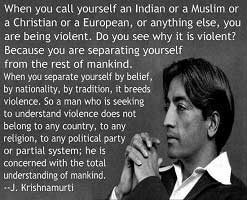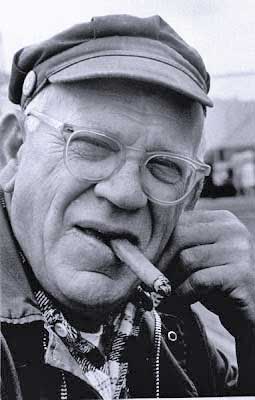
The Christian philosopher, Victor Reppert recently asked at his blog, “Do Christian apologists and atheists agree on something important that much of the world denies?”
I tend to doubt that such a question is quite as insightful as the fact that fanatics/fundamentalists who attach themselves to mass movements (in either religion or politics) seem to have much in common; while the rest of humanity, perhaps the majority in fact, appear less fanatical/fundamentalistic, and have learned to live a bit more autonomously (not merely being drawn to become cogs in mass movements) and learned to acknowledge uncertainties in their belief systems along with varying degrees of both hope and fear. I even suspect that “moderate” Christians and “moderate” Moslems and “moderate” non-believers can often get along better with each other than fundamentalists/fanatics can with fellow fundamentalists/fanatics even within their own tradition.
Speaking of being drawn into mass movements of the religious or political nature, below are some quotations from Eric Hofferʼs little classic, The True Believer. It might be interesting to compare and contrast Hofferʼs psychological insights into what drives people to become “true believers” with say, C. S. Lewisʼs views expressed in “Man or Rabbit?” (especially in light of how I myself summed up matters above). But for now hereʼs Hoffer alone:
P22 “Faith in a holy cause is to a considerable extent a substitute for the lost faith in ourselves.” [Or, when faith in oneʼs own autonomy is not allowed to develop, such a person may join a mass movement, either religious or political.—E.T.B.]
P23 “The less justified a man is in claiming excellence for his own self, the more ready is he to claim all excellence for his nation, his religion, his race or his holy cause.”
“A man is likely to mind his own business when it is worth minding. When it is not, he takes his mind off his own meaningless affairs by minding other peopleʼs business.
“There is no doubt that in exchanging a self-centered for a selfless life we gain enormously in self-esteem. The vanity of the selfless, even those who practice utmost humility, is boundless.”
“One of the most potent attractions of a mass movement is its offering of a substitute for individual hope. This attraction is particularly effective in a society imbued with the idea of progress.”
P24 “In a modern society people can live without hope only when kept dazed and out of breath by incessant hustling.”
“The embracing of a substitute will necessarily be passionate and extreme. We can have qualified confidence in ourselves, but the faith we have in our nation, religion, race or holy cause has to be extravagant and uncompromising. A substitute embraced in moderation cannot supplant and efface the self we want to forget. We cannot be sure that we have something worth living for unless we are ready to die for it.”
P45 “The chief passion of the frustrated is ‘to belong’…”
Chapter 11: The Sinners
Pp55-56 “An effective mass movement cultivates the idea of sin. It depicts the autonomous self not only (p56) as barren and helpless but also as vile. To confess and repent is to slough off oneʼs individual distinctness and separateness, and salvation is found in losing oneself in the holy oneness of the congregation.”
Chapter 12: Preface to Part Three: United Action and Self-Sacrifice
P58 “What ails the frustrated? It is the consciousness of an irremediably blemished self. Their chief desire is to escape that self-and it is this desire which manifests itself in a propensity for united action and self-sacrifice.”
P59 “Both united action and self-sacrifice require self-diminution. In order to become part of a compact whole, the individual has to forgo much. He has to give up privacy, individual judgment and often individual possessions. To school a person to united action is, therefore, to ready him for acts of self-denial.
Pp 59-60 “The technique for fostering a readiness to fight and to die consists in separating the individual from his flesh-and-blood self-in not allowing him to be his real self. (p60) This can be achieved by the thorough assimilation of the individual into a compact collective body-by endowing him with an imaginary self (make-believe); by implanting in him a deprecating attitude toward the present and riveting his interest on things that are not yet; by interposing a fact-proof screen between him and reality (doctrine); by preventing through the injection of passions, the establishment of a stable equilibrium between the individual and his self (fanaticism).
P60 “To ripen a person for self-sacrifice he must be stripped of his individual identity and distinctness. The most drastic way to achieve this end is by the complete assimilation of the individual into a collective body. The fully assimilated individual does not see himself and others as human beings.”
“He has no purpose, worth and destiny apart from his collective body; and as long as that body lives he cannot really die.”
P61 “To be cast out from the group should be equivalent to being cut off from life.”
P75 “The readiness for self-sacrifice is contingent on an imperviousness to the realities of life.”
“All mass movements strive, therefore, to interpose a fact-proof screen between the faithful and the realities of the world. They do this by claiming that the ultimate and absolute truth is already embodied in their doctrine and that there is no truth nor certitude outside it. The facts on which the true believer bases his conclusions must not be derived from his experience or observation but from holy writ.”
p76 “It is the true believerʼs ability to ‘shut his eyes and stop his ears’ to facts that do not deserve to be either seen or heard which is the source of his unequaled fortitude and constancy. He cannot be frightened by danger nor disheartened by obstacle nor baffled by contradictions because he denies their existence. Strength of faith, as Bergson pointed out, manifests itself not in moving mountains but in not seeing mountains to move.”
“Thus the effectiveness of a doctrine should not be judged by its profundity, sublimity or the validity of the truths it embodies, but by how thoroughly it insulates the individual from his self and the world as it is. What Pascal said of an effective religion is true of any effective doctrine; It must be ‘contrary to nature, to common sense and to pleasure.’”
“The effectiveness of a doctrine does not come from its meaning but from its certitude. No doctrine however profound and sublime will be effective unless it is presented as the embodiment of the one and only truth.”
“In order to be effective a doctrine must not be understood, but has to be believed in. We can be absolutely certain only about things we do not understand. A doctrine that is understood is shorn of its strength.”
P77 “If a doctrine is not unintelligible, it has to be vague; and if neither unintelligible nor vague, it has to be unverifiable. One has to get to heaven or the distant future to determine the truth of an effective doctrine. When some part of the doctrine is relatively simple, there is a tendency among the faithful to complicate and obscure it. Simple words are made pregnant with meaning and made to look like symbols in a secret message. There is thus an illiterate air about the most literate true believer. He seems to use words as if he were ignorant of their true meaning. Hence, too, his taste for quibbling, hair-splitting and scholastic tortuousness.”
“To be in possession of an absolute truth is to have a net of familiarity spread over the whole of eternity. There are no surprises and no unknowns. All question have already been answered, all decisions made, all eventualities foreseen. The true believer is without wonder and hesitation. ‘Who knows Jesus knows the reason of all things.’ The true doctrine is a master key to all the worldʼs problems. With it the world can be taken apart and put together.”
P78 “An active mass movement rejects the present and centers its interest on the future. It is from this attitude that it derives its strength, for it can proceed recklessly with the present-with the health, wealth and lives of its followers. But it must act as if it had already read the book of the future to the last word. Its doctrine is proclaimed as a key to that book.”
“The urge to escape our real self is also the urge to escape the rational and the obvious. The refusal to see ourselves as we are develops a distaste for facts and cold logic.”
“They ask to be deceived. What Stresemann said of the Germans is true of the frustrated in general: ‘[They] pray not only for [their] daily bread, but also for [their] daily illusion’. The rule seems to be that those who find no difficulty in deceiving themselves are easily deceived by others. They are easily persuaded and led.”
P79 “A peculiar side of credulity is that it is often joined with a proneness to imposture. The association of believing and lying is not characteristic solely of children. They inability or unwillingness to see things as they are promotes both gullibility and charlatanism.“
“Only the individual who has comes to terms with his self have a dispassionate attitude toward the world.”
P80 “By kindling and fanning violent passions in the hearts of their followers, mass movements prevent the settling of an inner balance. They also employ direct means to effect an enduring estrangement from the self. They depict an autonomous, self-sufficient existence not only as barren and meaningless but also as depraved and evil. Man on his own is a helpless, miserable and sinful creature. His only salvation is in rejecting his self and in finding a new life in the bosom of a holy corporate body-be it a church, a nation or a party. In its turn, this vilification of the self keeps passion at a white heat.”
“He [the fanatic]embraces a cause not primarily because of its justness and holiness but because of his desperate need for something to hold on to.”
P89 “Self-righteousness is a loud din raised to drown the voice of guilt within us.”
“There is a guilty conscience behind every brazen word and act and behind every manifestation of self-righteousness.”
P90 “A sublime religion inevitably generates a strong feeling of guilt. There is an unavoidable contrast between loftiness of profession and imperfection of practice. And, as one would expect, the feeling of guilt promotes hate and brazenness. Thus it seems that the more sublime the faith the more virulent the hatred it breeds.”
Pp91-92 “Their clamor for a (p92) millennium is shot through with a hatred for all that exists, and a craving for the end of the world.”
P92 “Passionate hatred can give meaning and purpose to an empty life.”
P93 “The act of self-denial seems to confer on us the right to be harsh and merciless toward others. The impression somehow prevails that the true believer, particularly the religious individual, is a humble person. The truth is that the surrendering and humbling of the self breed pride and arrogance. The true believer is apt to see himself as one of the chosen, the salt of the earth, a prince disguised in meekness, who is destined to inherit this earth and the kingdom of heaven, too. He who is not of his faith is evil; he who will not listen shall perish.
“There is also this: when we renounce the self and become part of a compact whole, we not only renounce personal advantage but are also rid of personal responsibility. There is no telling to what extremes of cruelty and ruthlessness a man will go when he is freed from the fears, hesitations, doubts and the vague stirrings of decency that go with individual judgment. When we lose our individual independence in the corporateness of a mass movement, we find a new freedom-freedom to hate, bully, lie, torture, murder and betray without shame and remorse.”
“Any violence which does not spring from a firm, spiritual base, will be wavering and uncertain. It lacks the stability which can only rest in a fanatical outlook.” [Adolf Hitler. Mein Kampf (Boston: Houghton Mifflin Company, 1943), p 171.]
“Thus hatred is not only a means to unification but also its product. Renan says that we have never, since the world began, heard of a merciful nation. Nor, one may add, have we heard of a merciful church or a merciful revolutionary party.”
P94 “Imitation is an essential unifying agent. The development of a close-knit group is inconceivable without a diffusion of uniformity. The one-mindedness and Gleichschaltung prized by every mass movement are achieved as much by imitation as by obedience. Obedience itself consists as much in the imitation of an example as in the following of a precept.
“The chief burden of the frustrated is the consciousness of a blemished, ineffectual self, and their chief desire is to slough off the unwanted self and begin a new life. They try to realize this desire either by finding a new identity or by blurring and camouflaging their individual distinctness; and both these ends are reached by imitation.
P95 “The less satisfaction we derive from being ourselves, the greater is our desire to be like others.”
“The desire to belong is partly a desire to lose oneself.”
“Finally, the lack of self-confidence characteristic of the frustrated also stimulates their imitativeness. The more we mistrust our judgment and luck, the more we are ready to follow the example of others.”
P96 “Imitation is often a shortcut to a solution. We copy when we lack the inclination, the ability or the time to work out an independent solution. People in a hurry will imitate more readily than people at leisure. Hustling thus tends to produce uniformity. And in the deliberate fusing of individuals into a compact group, incessant action will play a considerable role.”
P107 “The quality of ideas seems to play a minor role in mass movement leadership. What counts is the arrogant gesture, the complete disregard of the opinion of others, the single-handed defiance of the world.
“Charlatanism of some degree is indispensable to effective leadership. There can be no mass movement without some deliberate misrepresentation of facts.” [Emphasis added]
p108 “The total surrender of a distinct self is a prerequisite for the attainment of both unity and self-sacrifice; and there is probably no more direct way of realizing this surrender than by inculcating and extolling the habit of blind obedience.”
“All mass movements rank obedience with the highest of virtues and put it on a level with faith: ‘union of minds requires not only a perfect accord in the one Faith, but complete submission and obedience of will to the Church and the Roman Pontiff as to God Himself’. [Leo XIII, Sepientiae Christianae. According to Luther, “Disobedience is a greater sin than murder, unchastity, theft and dishonest…” Quoted by Jerome Frank, Fate and Freedom (New York: Simon and Schuster, Inc., 1945), p. 281] Obedience is not only the first law of God, but also the first tenet of a revolutionary party and of fervent nationalism.“
P114 Suspicion
“Self-contempt, however vague, sharpens our eyes for the imperfections of others. We usually strive to reveal in others the blemishes we hide in ourselves.”
“Strict orthodoxy is as much the result of mutual suspicion as of ardent faith.”
For Further Eric Hoffer Gems click here and here




